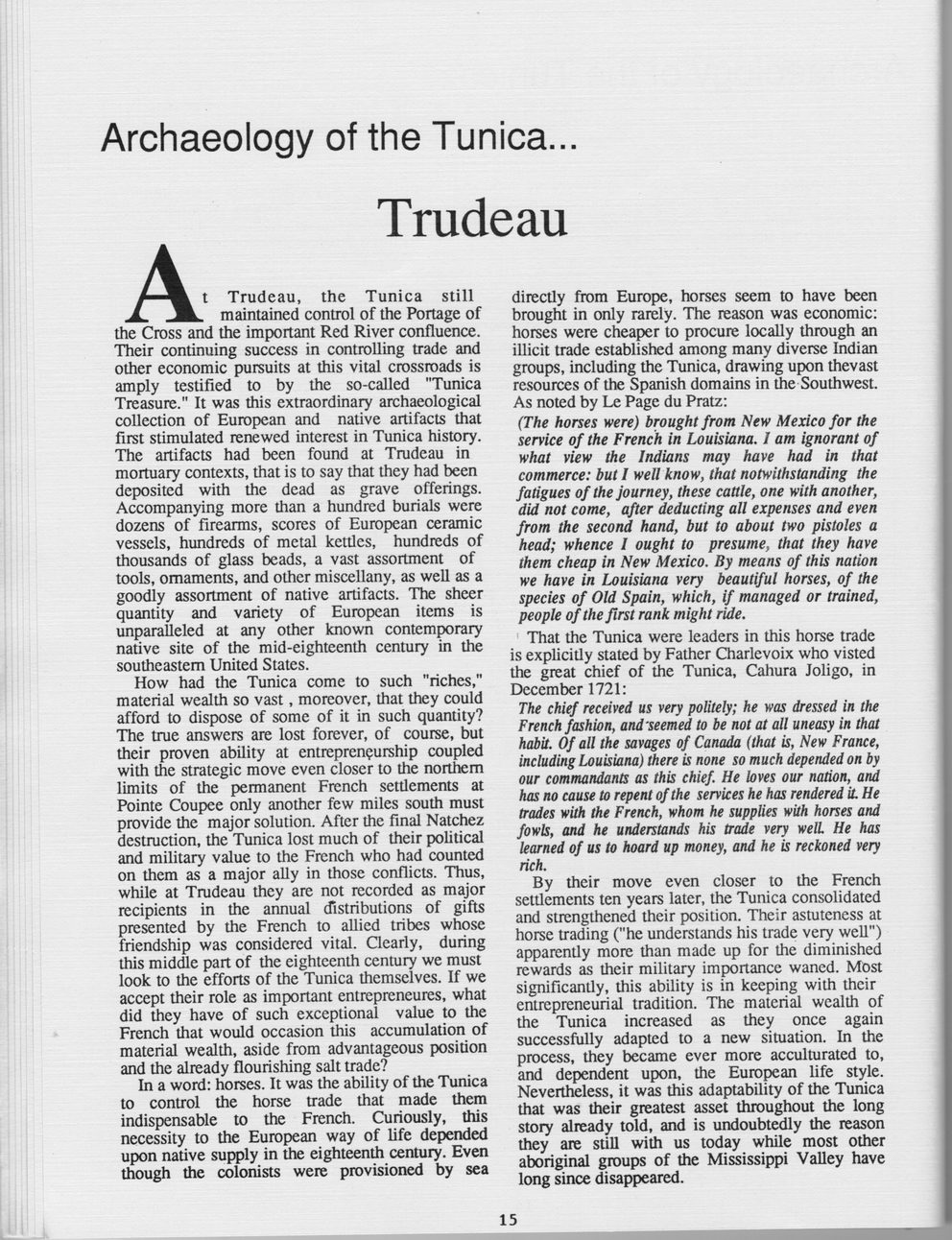This text was obtained via automated optical character recognition.
It has not been edited and may therefore contain several errors.
Archaeology of the Tunica...
Trudeau
At Trudeau, the Tunica still maintained control of the Portage of the Cross and the important Red River confluence. Their continuing success in controlling trade and other economic pursuits at this vital crossroads is amply testified to by the so-called "Tunica Treasure." It was this extraordinary archaeological collection of European and native artifacts that first stimulated renewed interest in Tunica history. The artifacts had been found at Trudeau in mortuary contexts, that is to say that they had been deposited with the dead as grave offerings. Accompanying more than a hundred burials were dozens of firearms, scores of European ceramic vessels, hundreds of metal kettles, hundreds of thousands of glass beads, a vast assortment of tools, ornaments, and other miscellany, as well as a goodly assortment of native artifacts. The sheer quantity and variety of European items is unparalleled at any other known contemporary native site of the mid-eighteenth century in the southeastern United States.
How had the Tunica come to such "riches," material wealth so vast, moreover, that they could afford to dispose of some of it in such quantity? The true answers are lost forever, of course, but their proven ability at entrepreneurship coupled with the strategic move even closer to the northern limits of the permanent French settlements at Pointe Coupee only another few miles south must provide the major solution. After the final Natchez destruction, the Tunica lost much of their political and military value to the French who had counted on them as a major ally in those conflicts. Thus, while at Trudeau they are not recorded as major recipients in the annual distributions of gifts presented by the French to allied tribes whose friendship was considered vital. Clearly, during this middle part of the eighteenth century we must look to the efforts of the Tunica themselves. If we accept their role as important entrepreneures, what did they have of such exceptional value to the French that would occasion this accumulation of material wealth, aside from advantageous position and the already flourishing salt trade?
In a word: horses. It was the ability of the Tunica to control the horse trade that made them indispensable to the French. Curiously, this necessity to the European way of life depended upon native supply in the eighteenth century. Even though the colonists were provisioned by sea
directly from Europe, horses seem to have been brought in only rarely. The reason was economic: horses were cheaper to procure locally through an illicit trade established among many diverse Indian groups, including the Tunica, drawing upon thevast resources of the Spanish domains in the Southwest. As noted by Le Page du Pratz:
(The horses were) brought from New Mexico for the service of the French in Louisiana. I am ignorant of what view the Indians may have had in that commerce: but I well know, that notwithstanding the fatigues of the journey, these cattle, one with another, did not come, after deducting all expenses and even from the second hand, but to about two pistoles a head; whence I ought to presume, that they have them cheap in New Mexico. By means of this nation we have in Louisiana very beautiful horses, of the species of Old Spain, which, if managed or trained, people of the first rank might ride.
That the Tunica were leaders in this horse trade is explicitly stated by Father Charlevoix who visted the great chief of the Tunica, Cahura Joligo, in December 1721:
The chief received us very politely; he was dressed in the French fashion, and seemed to be not at all uneasy in that habit. Of all the savages of Canada (that is, New France, including Louisiana) there is none so much depended on by our commandants as this chief. He loves our nation, and has no cause to repent of the services he has rendered it. He trades with the French, whom he supplies with horses and fowls, and he understands his trade very well He has learned of us to hoard up money, and he is reckoned very rich.
By their move even closer to the French settlements ten years later, the Tunica consolidated and strengthened their position. Their astuteness at horse trading ("he understands his trade very well") apparently more than made up for the diminished rewards as their military importance waned. Most significantly, this ability is in keeping with their entrepreneurial tradition. The material wealth of the Tunica increased as they once again successfully adapted to a new situation. In the process, they became ever more acculturated to, and dependent upon, the European life style. Nevertheless, it was this adaptability of the Tunica that was their greatest asset throughout the long story already told, and is undoubtedly the reason they are still with us today while most other aboriginal groups of the Mississippi Valley have long since disappeared.
15

Native Americans The-Tunica-Biloxi-Tribe-its-Culture-and-People-(22)